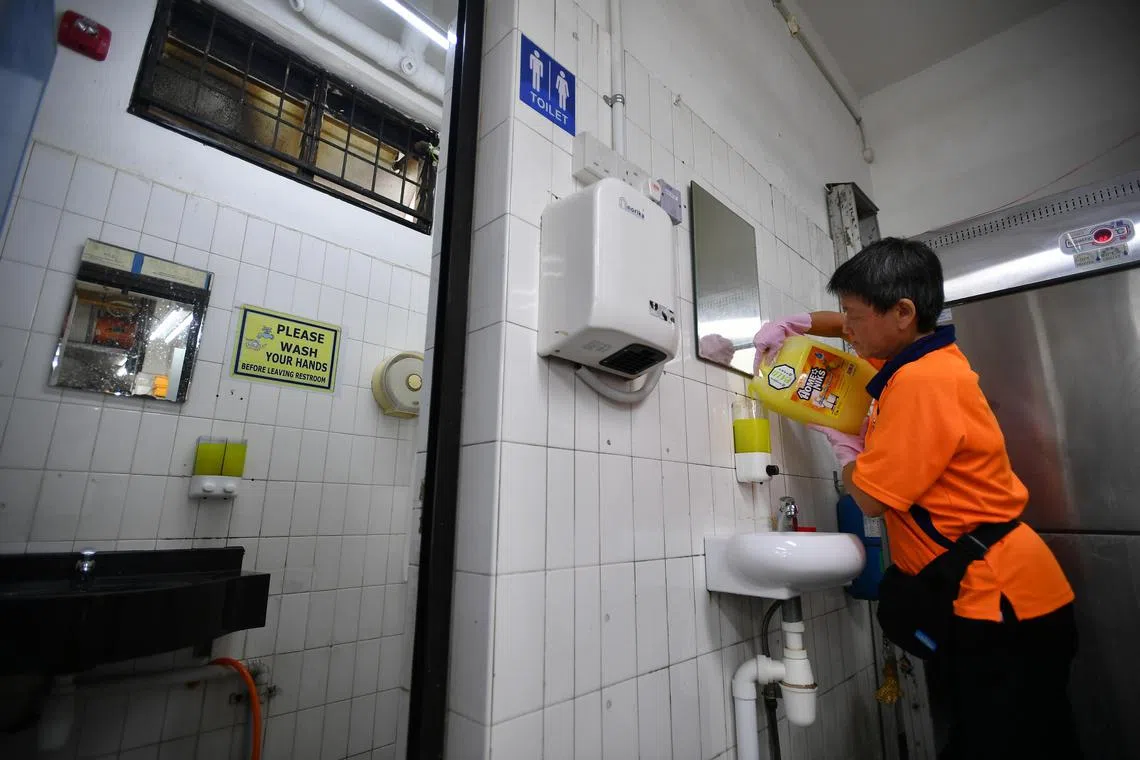Task force recommends grants for renovations, deep cleaning to improve coffee shop toilet cleanliness
Sign up now: Get ST's newsletters delivered to your inbox

The Public Toilets Task Force was formed in 2024 to study solutions to improve the cleanliness of public toilets here.
ST PHOTO: LIM YAOHUI
SINGAPORE - A task force has recommended that coffee shop operators be given grants to undertake toilet renovations or incorporate regular deep cleaning in their restrooms.
To receive the grants, operators would need to be certified under a new standard for such eateries here, said the Public Toilets Task Force in a report released on Feb 21.
Co-chaired by Senior Parliamentary Secretary for Sustainability and the Environment Baey Yam Keng and Public Hygiene Council chairman Andrew Khng, the task force was convened in 2024 to study and recommend solutions to improve the cleanliness of public toilets here.
The standard will be developed by the Restroom Association of Singapore, grading facilities on criteria such as cleanliness and maintenance, while accounting for the common constraints faced by coffee shops.
The coffee shop toilet renovation grant – aimed at updating and improving the design, features and ease of maintenance of toilets – will also require that in-house toilet cleaners undergo on-site training on routine cleaning, to help sustain cleanliness standards.
Meanwhile, the coffee shop toilet deep cleaning grant could require such eateries to adopt deep cleaning standards and ensure that deep cleaning is properly carried out. The task force said deep cleaning would remove odours and persistent stains that general cleaning might not be able to address.
“For example, grant conditions could require coffee shop supervisors to conduct regular checks on toilet cleanliness and in-house toilet cleaners to be trained on routine cleaning. These would ensure that grant recipients meet cleanliness standards,” the task force said in the report.
An islandwide study of 2,602 public toilets here by Singapore Management University in 2024 found coffee shop toilets to be among the dirtiest.
In 2020, the National Environment Agency (NEA) introduced a year-long Toilet Improvement Programme for coffee shops, co-funding operators up to 90 per cent of the cost of improving toilet design or adopting technology to facilitate their cleaning and maintenance, capped at $45,000.
However, only 44 coffee shops out of more than 1,000 islandwide signed up for the programme.
The 23-member task force also developed a list of recommended toilet design features to guide operators in understanding what a well-designed toilet that facilitates easy cleaning and maintenance should have.
Such features include the provision of at least one hand wash basin outside toilets for common use to prevent toilet floors from getting wet, as well as features such as exhaust fans to facilitate ventilation and dry wet floors.
The list also recommends that toilet entrances and common hand wash basins be at least 5m away from the nearest food stall where possible, with a physical wall between the basins and food stalls.
The task force called for toilet cleaners to have a simple pictorial guide with step-by-step instructions on toilet cleaning, as well as training in relevant courses.
It also recommended using technology such as feedback systems to enhance cleanliness.
In addition, a risk-based inspection regime could be introduced, with poorly performing toilets inspected more regularly.
The task force also proposed that a survey be carried out to study the user profile of poor-performing toilets, noting that this could help identify specific amenities that could be used to address the problems faced by certain groups in using toilets or keeping them clean.
“Together, we can create a Singapore that shines not just in its skyline, but in every corner, including at our public toilets,” said Mr Baey and Mr Khng in a foreword to the report.
“This is more than just a cleanliness campaign; it is a movement towards a more caring, considerate, clean, and hygienic society,” they added.
In a Facebook post, Mr Baey said the recommendations had been submitted to Minister for Sustainability and the Environment Grace Fu.
Thanking the task force for its “hard work and invaluable insights”, Ms Fu said her ministry would review the recommendations and provide its response during the upcoming debate on its budget.
In 2024, efforts to improve the cleanliness of public toilets were stepped up, with the Singapore Food Agency (SFA) suspending 10 coffee shops for toilet-related and food safety offences under the Points Demerit System, compared with just one suspension each in 2022 and 2023.
Additionally, the SFA and NEA took more than 1,200 enforcement actions, such as fines and warnings, against owners of premises in 2024 over a lack of public toilet cleanliness – up from over 360 in 2023.


